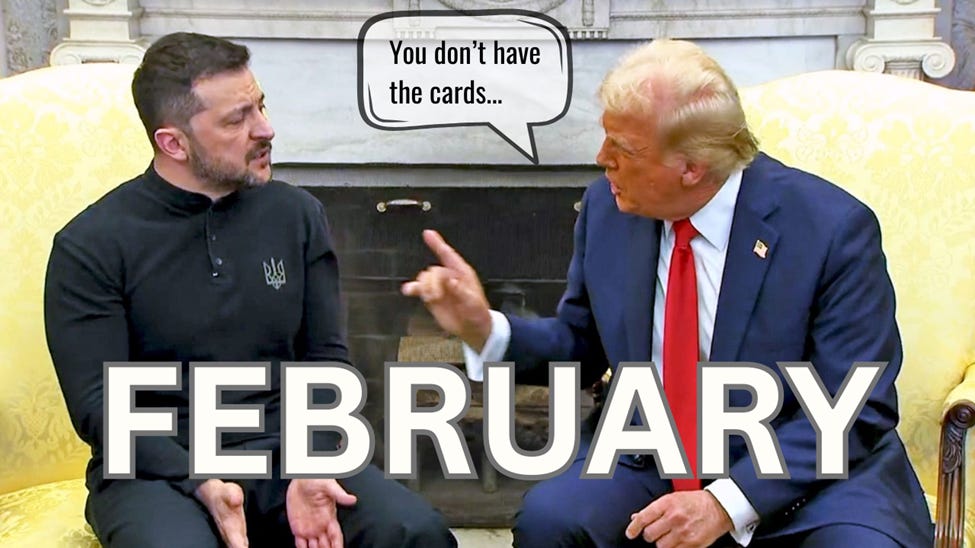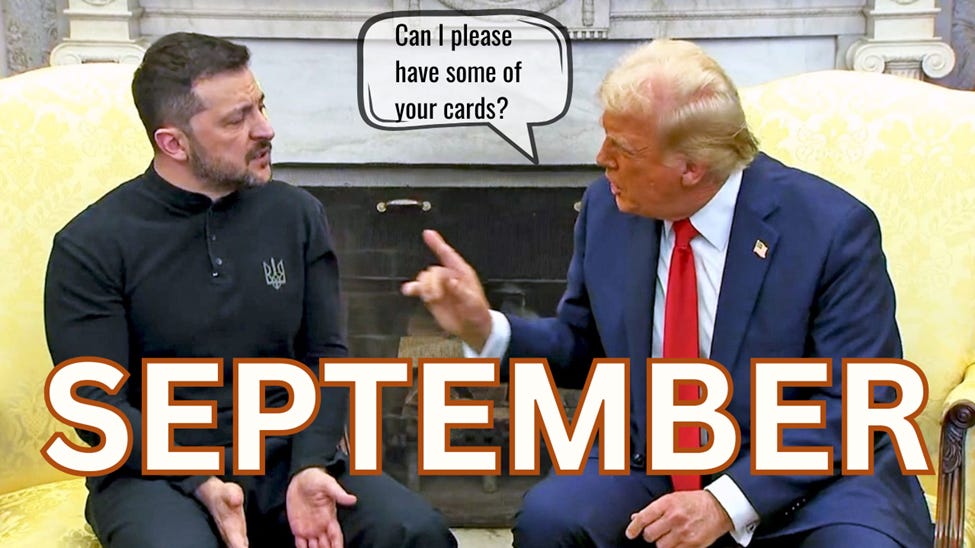From Reluctance to Recognition: The U.S. and Ukraine’s “Cards”
by Benjamin Cook
Six months ago, the U.S. position on Ukraine could be summed up in one phrase: you don’t have the cards. Even under the Biden administration, support was hesitant—drawn out by political wrangling, framed as reluctant necessity rather than full-throated backing. Washington wanted Ukraine to hold the line, but rarely gave it what it needed without delay, conditions, or second-guessing.
Now, as NBC reports, the tone has shifted. A proposed $100 billion agreement would give Ukraine access to American weapons in exchange for Washington securing intellectual property rights to defense technologies developed by Ukrainian engineers. The shift is stark: from lecturing Kyiv on what it lacked, to acknowledging that Ukraine possesses valuable “cards”—military experience, battlefield innovation, and operational credibility—that the United States wants a share of.
Ukraine’s Unmistakable Military Weight
Reluctant support has not stopped Ukraine from becoming one of the most capable fighting forces in the world. By some measures, Ukraine now fields the third or fourth most powerful army globally. It has spent nearly three years grinding down what was once thought to be the world’s second-largest military. Its air defense network is unmatched in experience, with thousands of successful intercepts of cruise missiles, drones, and, most critically, ballistic missiles—an area where even Western militaries have little real combat testing.
Readers searching for high-quality information - such as yourself - might prefer to support my work with a one time contribution vs a subscription. https://buymeacoffee.com/researchukraine
Ukraine’s capacity to adapt on the fly—rapidly integrating donated systems, fusing NATO and Soviet equipment, and developing indigenous strike drones and electronic warfare tools—has made it a laboratory of modern warfare. Far from a client state limping along on U.S. handouts, Ukraine has proven itself as a central innovator in 21st-century combat.
This is what Washington now wants access to: not just another buyer for U.S. weapons, but a partner whose battlefield-forged technologies can be pulled into the American arsenal.
Recognition, But To What End?
The key question is why the U.S. is recognizing Ukraine’s leverage now. Is it about helping Ukraine secure victory—or about something else?
As the likelihood of conflict with China grows, the U.S. faces hard truths. Defending the Philippines, South Korea, and Japan will depend on intercepting missile and drone barrages at scale. Yet the U.S. military has comparatively little live-fire experience against modern salvos of ballistic and cruise missiles. Ukraine, by contrast, has done it daily. Its engineers and operators have learned under fire what works, what fails, and how to adapt faster than an adversary can innovate. It seems the closest analog to shooting down a Chinese ballistic missile is shooting down a Russian ballistic missile. The closest thing to a Chinese swarm of hundreds of drones, cruise missiles and ballistic missiles is a Russian swarm. Ukraine has this data. It takes this data and turns it into technical expertise. These, in Trump-Speak, are “Cards.”
From this perspective, the “cards” Ukraine holds may be less about securing Odesa, Kharkiv, or NATO, and more about ensuring that U.S. forces can credibly defend Taipei or Manila. The proposed IP-for-weapons deal, then, reads as much like preparation for Asia as it does commitment to Eastern Europe.
Does the “Why” Matter?
For Ukraine, the calculus may be pragmatic. Whether Washington values Ukrainian innovation because of Kyiv’s survival or because of Taiwan’s defense, the material outcome is the same: weapons, funding, and recognition of Ukraine’s role as a top-tier military power.
Still, the “why” does matter when considering long-term commitments. If U.S. interest in Ukraine is instrumental—simply harvesting battlefield lessons for use elsewhere—support may remain transactional. The danger is that when the focus shifts fully to Asia, Ukraine could find itself once again told it “doesn’t have the cards.”
Yet there is also opportunity. By proving indispensable not only for Europe’s security but for the Pacific balance of power, Ukraine ensures that its struggle cannot be ignored or written off. The more its innovations and experience are recognized as global assets, the harder it becomes for Washington to disengage entirely.
Key Take Away
The U.S. has moved from skepticism to recognition: Ukraine does, in fact, hold valuable cards. But the evolution says as much about America’s looming confrontation with China as it does about commitment to Kyiv. Whether this recognition stems from genuine support for Ukraine or from the strategic needs of the Pacific, the effect is the same—Ukraine’s value is undeniable.
The challenge for Kyiv is to make sure that when Washington asks for its cards, it pays the full price—because Ukraine has already proven it belongs at the very center of modern military power.
Benjamin Cook continues to travel to, often lives in, and works in Ukraine, a connection spanning more than 14 years. He holds an MA in International Security and Conflict Studies from Dublin City University and has consulted with journalists and intelligence professionals on AI in drones, U.S. military technology, and open-source intelligence (OSINT) related to the war in Ukraine. He is co-founder of the nonprofit UAO, working in southern Ukraine. You can find Mr. Cook between Odesa, Ukraine; Charleston, South Carolina; and Tucson, Arizona.
Hate Subscriptions? Me too! You can support me with a one time contribution to my research at Buy Me a Coffee. https://buymeacoffee.com/researchukraine




This is another sane-washing of Trump and ignoring the realities of his regime.
Currently you cannot write about the US acting as if it had any interests of it's own, because it doesn't work like that anymore. There's no one acting in the interests of the US as a state, there's Trump doing his own grifting, there are his cronies, there are different interest groups, but none of them represent the entire country or act on its behalf.
US cannot recognize or be reluctant, because the "Deep State" (if it ever existed) has been dismantled. There are only separate MAGA-individuals, and actions of the US are an unpredictable result of changing power games within trumpist movement.
Yes, and can Ukraine trust the Orange Klown/Puppet not to ‘leak’ this IP to Putin? Surely, by now Ukraine knows it cannot trust this administration.